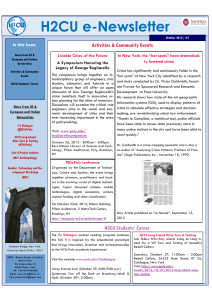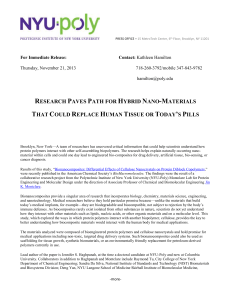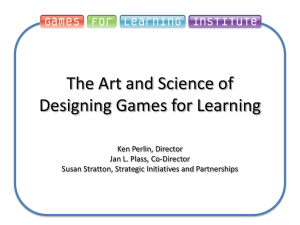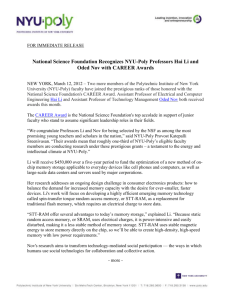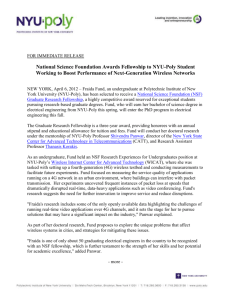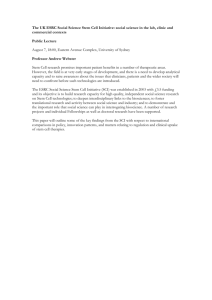For Immediate Release: Contact: Kathleen Hamilton Monday, July 8
advertisement
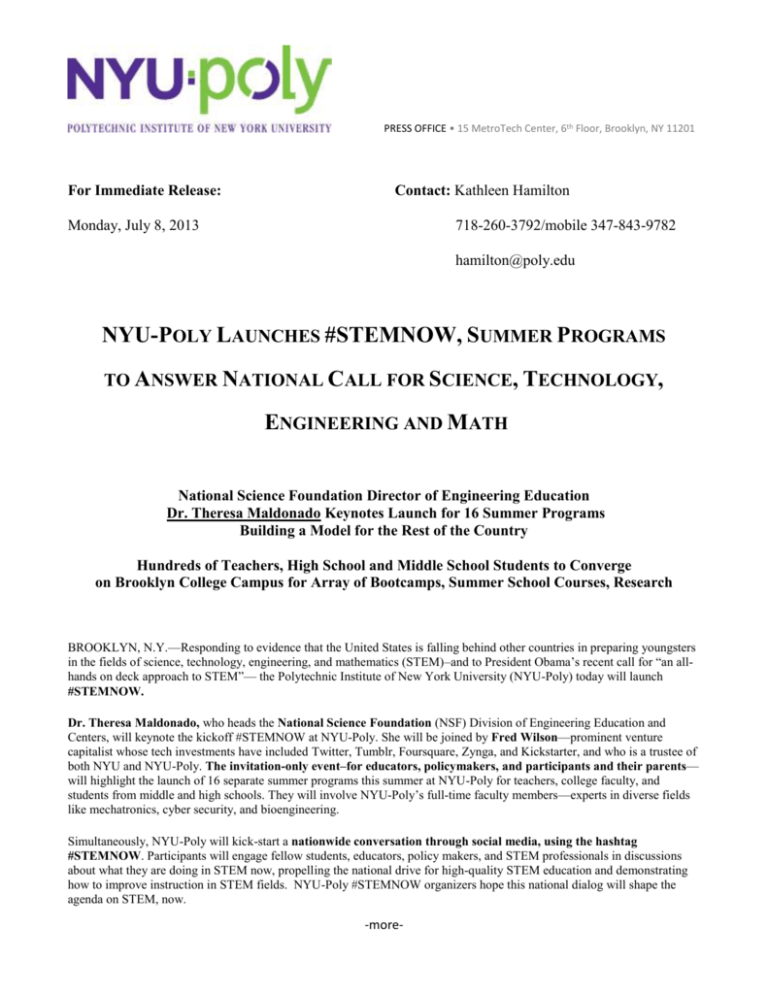
PRESS OFFICE • 15 MetroTech Center, 6th Floor, Brooklyn, NY 11201 For Immediate Release: Contact: Kathleen Hamilton Monday, July 8, 2013 718-260-3792/mobile 347-843-9782 hamilton@poly.edu NYU-POLY LAUNCHES #STEMNOW, SUMMER PROGRAMS TO ANSWER NATIONAL CALL FOR SCIENCE, TECHNOLOGY, ENGINEERING AND MATH National Science Foundation Director of Engineering Education Dr. Theresa Maldonado Keynotes Launch for 16 Summer Programs Building a Model for the Rest of the Country Hundreds of Teachers, High School and Middle School Students to Converge on Brooklyn College Campus for Array of Bootcamps, Summer School Courses, Research BROOKLYN, N.Y.—Responding to evidence that the United States is falling behind other countries in preparing youngsters in the fields of science, technology, engineering, and mathematics (STEM)–and to President Obama’s recent call for “an allhands on deck approach to STEM”— the Polytechnic Institute of New York University (NYU-Poly) today will launch #STEMNOW. Dr. Theresa Maldonado, who heads the National Science Foundation (NSF) Division of Engineering Education and Centers, will keynote the kickoff #STEMNOW at NYU-Poly. She will be joined by Fred Wilson—prominent venture capitalist whose tech investments have included Twitter, Tumblr, Foursquare, Zynga, and Kickstarter, and who is a trustee of both NYU and NYU-Poly. The invitation-only event–for educators, policymakers, and participants and their parents— will highlight the launch of 16 separate summer programs this summer at NYU-Poly for teachers, college faculty, and students from middle and high schools. They will involve NYU-Poly’s full-time faculty members—experts in diverse fields like mechatronics, cyber security, and bioengineering. Simultaneously, NYU-Poly will kick-start a nationwide conversation through social media, using the hashtag #STEMNOW. Participants will engage fellow students, educators, policy makers, and STEM professionals in discussions about what they are doing in STEM now, propelling the national drive for high-quality STEM education and demonstrating how to improve instruction in STEM fields. NYU-Poly #STEMNOW organizers hope this national dialog will shape the agenda on STEM, now. -more- Although President Obama has identified STEM education as one of his top national priorities, educators are finding some surprising barriers to students pursuing these subjects early enough to qualify them for college admission. In one recent study, only 2 percent of the high school students surveyed had a reasonably good grasp of what the field of computer science entailed. In another study, 61 percent of math-proficient 12th graders said they simply had no interest in STEM. "The United States was founded in a culture of curiosity, creativity and a can-do spirit," Dr. Maldonado said. “Today’s conversation is about helping students realize the connection between STEM and that enduring spirit. STEM education is vital to enable anyone and everyone to contribute, in his or her own way, to the great future of our country. Empowerment is the first step, and the National Science Foundation is here to support inspiring approaches to success." “I applaud the Polytechnic Institute of New York University for their leadership in providing educational opportunities for young students and educators in the science, technology, engineering, and mathematics fields through a variety of enriching programs,” said United States Rep. Hakeem Jeffries (NY-8). “America benefits economically when our youth are gainfully employed in traditionally successful career tracks such as those within STEM fields. The technology and innovation economy will be vital to our future economic prosperity and I applaud NYU-Poly for its effort to ensure maximum participation from traditionally underrepresented populations." “This institution has a long history of educating promising students from our community, admitting many young people from New York’s neighborhoods and helping them to obtain the knowledge and skills to become successful scholars, researchers, entrepreneurs, and highly valued employees,” said Dr. Katepalli R. Sreenivasan, NYU-Poly president and NYU dean of engineering. “Our Center for K12 STEM Education and others across campus exemplify that mission by developing programs, curricula, and teacher training that reaches into K-12 schools across Brooklyn, New York, and throughout the United States–early enough to prepare young students for STEM studies at the university level.” Sreenivasan continued: “Our experience in K-12 engineering programs proves how powerfully we can change students’ lives. We hope that #STEMNOW will allow participants to share similar successes and quickly propel the best initiatives to the forefront.” One dramatic example of STEM success is NYU-Poly’s year-round program, Applying Mechatronics to Promote Science, funded by the NSF, and Central Brooklyn STEM Initiative, funded by corporate philanthropy. Together, they send NYUPoly graduate students into 24 Brooklyn elementary, middle, and high schools throughout the year to challenge students to design, build and operate robotic devices, teach science and engineering, and provide training to advance teachers’ understanding of STEM subjects. The results are powerful: from 2009 to 2012, 70 percent of the 3,200 participating students increased their STEM grades by a half or full-letter grade. This summer, elementary, middle, and high school teachers will train and prepare on campus to take STEM knowledge back to their schools. (http://gk12.poly.edu/amps-cbri/). Others in the unusually wide spectrum of NYU-Poly #STEMNOW programs will find high school students extracting DNA and professional theater performers teaching public speaking to future engineers. High school students will teach STEM lessons to middle school campers; girls will get hands-on training to enter the lucrative and male-dominated field of cybersecurity; teachers will research and develop curriculum for exciting and emerging STEM fields; and youngsters with special needs will learn sound, special effects and audio engineering. Many of the programs are offered at no or reduced cost to participants. Highlights include: SMARTER—This NSF-funded program puts middle and high school teachers in NYU-Poly’s engineering laboratories with faculty and graduate students for 2 weeks of guided workshops and 4 weeks of research. This summer’s program builds on the highly successful SMART (Science and Mechatronics Aided Research for Teachers) program and adds an entrepreneurship component. http://mechatronics.poly.edu/smart/ Cybersecurity–With one of the oldest and most recognized cybersecurity programs in the country, NYU-Poly will host three bootcamps for high school girls, high school teachers, and college teachers this summer under sponsorships from the NSF and the National Security Agency. All will prepare students to participate in NYUPoly’s annual Cyber Security Awareness Week – the biggest set of student challenges in hacking, protection and digital forensics. The demand for cyber security experts is growing at more than 10 times the overall job market, making it one of the most highly sought-after fields in the country, according to one recent report. http://www.poly.edu/events/2013/07/08/csaw-summer-program-young-women-high-school, -more- http://www.poly.edu/events/2013/07/28/csaw-cybersecurity-summer-bootcamp-high-school-teachers and http://www.poly.edu/events/2013/07/08/csaw-summer-research-and-training-college-faculty ARISE (Applied Research Innovations in Science and Engineering) is designed for high school students with little or no access to high quality STEM education experiences, students of color, and those from low-income backgrounds. The seven-week program features intensive mentoring and challenging college-level coursework and lab work in such fields as civil and urban engineering, composite materials, mechanics, protein engineering, and molecular design. http://arise.poly.edu/ College-Credit Courses—High school students who want to get a jump on college-credit courses or simply explore hot fields of study can enroll in a variety of subjects at a cost reduced by 75 percent from the usual undergraduate tuition. Web Design, Introduction to Engineering and Design, and Pre-Calculus are offered. http://www.poly.edu/highschoolsummer Bioengineering Research & Practice–High school students will get the rare opportunity to conduct biomedical research, including working with their own DNA. http://research.poly.edu/~jmontcla CrEST Mobile—Testing the old saying that teaching is the best way of learning, 12 high school students who completed the NYU-Poly Creativity in Engineering, Science and Technology (CrEST) program last term will be placed with community-based organizations to teach what they learned in physical computing, electronics, and sensors to middle school students in publicly funded summer camps. http://crest.poly.edu K-12 STEM Lab BotCamp–Up to 20 middle and high school students will turn their engineering lessons into real prototypes through this partnership with 3D printer pioneer MakerBot Industries®. http://www.poly.edu/events/2013/07/08/summer-botcamp-nyu-poly NYU-Poly/NCSSSMST (the National Consortium for Specialized Secondary Schools of Mathematics, Science, and Technology) Summer Institute for STEM Educators brings teachers, counselors and leaders from top STEM high schools in the country to the NYU-Poly campus to expose them to experimental techniques, design skills, teamwork and the tools of technic and research professionals. : http://www.poly.edu/events/2013/07/16/nyu-poly-ncsssmst2013-summer-institute-stem-educators Research Opportunities for High School Students--Students from Brooklyn Technical High School and Stuyvesant High School will conduct research alongside professors and doctoral candidates in areas such as web design, wireless technology, cybersecurity, and the electrical engineering neuroscience lab. Science of Smart Cities introduces middle school students to the engineering, science, and technology that make cities more livable, efficient, sustainable, and safer. Exemplifying the trend called STEAM–adding arts education to STEM—the Irondale Theater Company will help these young engineers develop their presentation skills. http://sosc.poly.edu Tech Kids Unlimited – Technology can be a great equalizer for those with learning difficulties, and these workshops aim to provide special-needs students, age 9 to 17, with the 21st-century technology tools they require for success. The summer workshop on sound, special effects, and audio engineering will help participants become producers of tech culture, rather than just passive consumers. NYU-Poly Adjunct Professor Beth Rosenberg founded the program after realizing that her son, who learns differently, loved technology but wasn’t being exposed to it during the school day. http://www.techkidsunlimited.org/ The Polytechnic Institute of New York University (formerly the Brooklyn Polytechnic Institute and the Polytechnic University, now widely known as NYU-Poly) is an affiliated institute of New York University, soon to be its School of Engineering. NYUPoly, founded in 1854, is the nation’s second-oldest private engineering school. It is presently a comprehensive school of education and research in engineering and applied sciences, rooted in a 159-year tradition of invention, innovation and entrepreneurship. It remains on the cutting edge of technology, innovatively extending the benefits of science, engineering, management and liberal studies to critical real-world opportunities and challenges, especially those linked to urban systems, health and wellness, and the global information economy. In addition to its programs on the main campus in New York City at MetroTech Center in downtown Brooklyn, it offers programs around the globe remotely through NYUe-Poly. NYU-Poly is closely connected to engineering in NYU Abu Dhabi and NYU Shanghai and to the NYU Center for Urban Science and Progress (CUSP) also at MetroTech, while operating two incubators in downtown Manhattan and Brooklyn. For more information, visit www.poly.edu. ###
